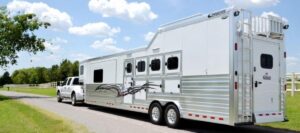Is your horse activity a business, or just an expensive hobby? The real test comes if you claim your horses as business expenses, and then the IRS audits your federal income tax return and challenges the deductions under what is known as the “Hobby Loss” rule. The Hobby Loss rule prohibits a taxpayer from claiming the expenses of a hobby as business expense deductions.
Whether you run your horse activities through a “company” of any sort doesn’t matter to the IRS. In order for company expenses to be deductible as business expenses, the company must be a “business” by IRS standards. For a company engaged in horse activities, this means that the company must be engaged in its business with an actual and honest profit objective. Whether or not this objective exists is, for all practical purposes, evaluated by the IRS from a profit-loss standpoint: if the business is showing a profit and paying taxes, the IRS will happily accept the money and probably leave the taxpayer alone; but if the business is operating at a loss, thus causing the taxpayer to pay less in taxes, the IRS is more likely to get inquisitive. Since most horse “businesses” operate at a loss, deducting horse-related expenses as business expenses is a “red flag” for the IRS and can lead to the very unpleasant experience of an audit. These audits are commonly referred to as “hobby loss” audits, as the IRS will contend that the horseperson/taxpayer is merely trying to get the government to partially subsidize an expensive hobby. And, expenses incurred in the pursuit of a “hobby” cannot be deducted as business expenses.
WHAT DO I WANT YOU TO DO TODAY?
This is a good time of year to sit down and do certain key things that will help in the event of a future audit:
- Analyze the past year’s income and expenses: I don’t mean just glance at the numbers. If you are audited, the IRS will be looking to see if you “analyzed” these numbers in a meaningful way that allows you to implement changes to your program in order to reduce expenses and increase income. How much money did you spend in each expense category, and why? Is there a way to cut back expenses by doing some things differently? You don’t want to just know how much you are spending, you need to think about whether you can be spending less.
- Calculate what you are spending on a per-horse basis: if you have more than one horse, it is VERY important that you have a firm grasp on what you are spending per horse, per year. This figure can be specific to each horse, or it can be an average (based on the total costs divided by the total number of horses). Preferably, you do both.
- Re-assess asset values: you do not need to get a full blown appraisal of every horse every year, but you should get an opinion of value every year. If you have done #2 above, you should also be able to document your “cost basis” in every horse you own. In other words, you need to go through the process of looking at every horse in your barn and being able to say: this is how much I have into this horse, and this is how much this horse is worth today. If the purpose of owning the horse is to sell it, then doing this analysis lets you determine whether you stand to make money if you sell the horse soon, or if not, how much you are underwater on any specific horse.
- What sales price do you hope to achieve for this horse? And when? Do you expect the horse’s value to appreciate or depreciate over time? If so, based on your cost basis and an estimate of what it is costing you to maintain this horse per year, what is the minimum sales price that will allow you to break even on this horse? Will the expected sales price at Date X allow you to realize a profit on this horse, or not? If you are not going to make money on this horse, the IRS is going to ask why you continue to own and maintain it: you’d better have a good answer or else that horse starts to look less like a business asset and more like a pet.
- If you didn’t make money last year, what will you do to make money this year? To answer this question properly, you really need to look at your past numbers (#1 above), and come up with a plan to have a profitable year this year, and DO THE MATH: you need to write down how the numbers work out! You can’t just say “My plan is to sell more horses, earn more prize money, and make a profit!” You have to do the math, on paper, and show your work (think back to middle-school math). Ideally, you will take all your math and hard thinking of these items and come up with a plan for next year AND YOU WILL WRITE IT ALL DOWN.
Remember, a proper business plan is not just what you hope to do in the future, it is a documented analysis (including math) of what you have done in the past, what you hope to achieve in the future, and what you intend to do NOW as a stepping stone to realizing your future goals - If you have ever sustained a loss year, what is your plan for recouping past losses? In the past decade or so, the IRS has taken the position that “proving” you are a business requires being able to demonstrate how the business will make enough money in future years to recoup past losses. In other words, you have to analyze not only last year year, but previous loss years, and formulate a plan for how the entire enterprise will operate profitably over the course of its lifetime. Again, it is crucial that you crunch the numbers and write them down, and address recoupment of past losses as a long term business goal.
Ideally, you will take all your math and hard thinking of these items and come up with a plan for next year AND YOU WILL WRITE IT ALL DOWN. Remember, a proper business plan is not just what you hope to do in the future, it is a documented analysis (including math) of what you have done in the past, what you hope to achieve in the future, and what you intend to do NOW as a stepping stone to realizing your future goals – which for these purposes is one thing and one thing only: MAKING A PROFIT so you can pay more taxes to the IRS.
As painful as it may be to think about documenting a business plan, you must understand and accept that a proper business plan is not a one or two page document. It is more like a term paper or end of year project — the kind of thing you had to do in high school or college. Ideally, I am thinking 10 pages or more, with charts and numbers and calculations, and long paragraphs explaining what you’ve been doing, what you plan to do this year, what the future will look like, and any recent set backs.
“WHAT?” I know that is what you are asking yourself. I know that you are thinking that I am crazy. How do I expect you to find time to write a 10+ page report when you have horses to train and a barn to manage? Newsflash: getting audited will be WAY more painful and time consuming. So my advice to you is to do it now, get it over with, and file it away until next year. And if you get audited, you can thank me then… because I assure you the IRS examiner will be impressed.








